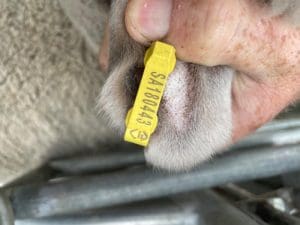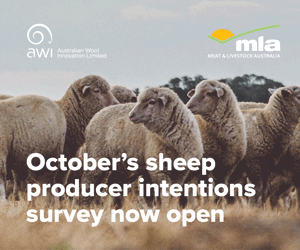 WESTERN Australia’s proposed sheep and goat electronic identification system rollout has been put back 18 months and other states are also discussing extending their timeframes.
WESTERN Australia’s proposed sheep and goat electronic identification system rollout has been put back 18 months and other states are also discussing extending their timeframes.
Last Friday, at the National Agricultural Ministers meeting, WA Food and Agriculture Minister Jackie Jarvis advised national colleagues of amendments to WA’s implementation timelines for EID for sheep and goats.
The dates for two of Western Australia’s on-farm implementation milestones in the sheep and goat EID national implementation plan will be changed to 1 July 2026. This includes moving the start date for mandatory electronic tagging of all sheep and goats (excluding newborns) that leave the farm from 1 January 2025 to 1 July 2026. Similarly, mandatory EID tagging for property to property movements will be deferred to 1 July 2026 in Western Australia. Mandatory scanning of EID at WA saleyards and abattoirs will be deferred from 1 January 2025 to 1 July 2025.
All state and federal agriculture and primary industries ministers had agreed on a harmonised national implementation date of 1 January 2025, with varying timelines for the tagging of all farmed sheep and goats leaving properties out to 1 January 2027. Up until WA’s decision, all states and territories had agreed that all newborn lambs and kids would be EID tagged after 1 January 2025.
Ms Jarvis told Sheep Central the timeline changes are in response to first-hand feedback she has received from the WA Sheep and Goat Advisory Committee and a number of sheep producers, and is better suited to WA farming conditions.
“The amendments allow WA to take a considered approach to implementation, while still maintaining momentum.”
“As I’ve always said I will to continue to advocate for farmers in WA,” he said.
WA EID tag working group member Steve McGuire said since the EID rollout was first announced, he has been seeking that it be put back 4-6 months to a mid-year implementation date, saving farmers and governments money by avoiding putting an EID tag in sheep that will be killed before 1 January. He said it has been difficult for processors to source the necessary EID readers to meet the previous timeline and WA’s Department of Primary Industries and Regional Development has had staffing issues.
“We want to avoid a dual scheme, where some sheep are tagged and some aren’t.”
 However, Mr McGuire recognised there was a biosecurity traceability risk by delaying the EID system rollout.
However, Mr McGuire recognised there was a biosecurity traceability risk by delaying the EID system rollout.
Pastoralists and Graziers Association Livestock Committee chair Chris Patmore said he had also written to Ms Jarvis recently explaining the WA sheep industry is “in a pretty bad way at the moment.”
“Now is not the time to introduce a new cost when most producers are losing are already losing money, and if we add another unnecessary cost not it is just going hasten their exit from the industry.”
Mr Patmore said the reason the WA sheep industry is in such a sad state is the global oversupply of meat and the threat of losing the live sheep export trade by sea. He said even with the proposed 75 cents rebate on EID ear tags in Western Australia, the cost of electronic tags would be around $1.20 each, compared to visual tag costs of 15 cents.
Mr Patmore said he was aware other states were thinking about delaying EID system implementation dates.
“There is a lot of pushback from producers at the moment, against adding any costs on, with producers putting pressure on their state farming organisations to pushback on this.”
He said further funding from state and federal governments would help.
NSW Farmers Sheepmeat committee chair Chris Kemp said he was not aware of discussions to change the NSW scheme timeline from a 1 January 2025 start date.
“We just need money for our tags, that’s what New South Wales needs.”
AgForce Sheep and Wool Board chairman Stephen Tully said there had been discussions about delaying implementation dates because of inaction and cost pressures.
“Our position is that we still can’t get decisions out of the Queensland Government for funding and that our still preferred pathway is to get that joint funding and those pathways to the processors up.
“But if we can’t achieve that and we can’t get decisions made soon then we will have no choice but to delay the implementation,” he said.
Queensland’s implementation timeline is the same as New South Wales’, with all managed farmed sheep and goats to be EID tagged before leaving a property on 1 January 2027.
“But we want a pathway to the abattoirs for this sheep that are already tagged and 50pc co-investment by government in the cost of the tags, similar to South Australia.
“And we would dearly love the Federal Government to come in with a bit of money to bring states together and get us all on the same page – that would be the best way to do it.”
Livestock SA president Joe Keynes said he would be bringing the issue of delaying timelines for discussion at the state’s implementation committee at the end of the month.
A Department of Agriculture, Fisheries and Forestry spokesperson said the nationally consolidated implementation plan for EID implementation as at 27 September 2023 is available on the Sheep and Goat Traceability taskforce page on the DAFF website: Sheep and Goat Traceability Task Force – DAFF (agriculture.gov.au)

HAVE YOUR SAY